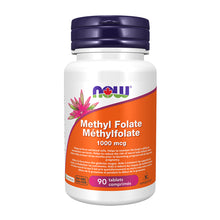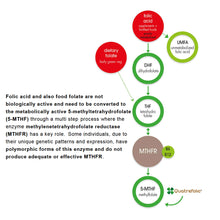Info: 90 Tablets (1000 mcg)
Methyl Folate is the active, most usable, and safest form of a B vitamin that's an important nutrient for men and women at all stages of life. This is a top quality version of 5-MTHF (Quatrefolic), standardized to a consistent strength, and shown to be even more bioavailable than some other active types since it's so water soluble.
Info: 90 Tablets (1000 mcg)
Methyl Folate is the active, most usable, and safest form of a B vitamin that's an important nutrient for men and women at all stages of life. This is a top quality version of 5-MTHF (Quatrefolic), standardized to a consistent strength, and shown to be even more bioavailable than some other active types since it's so water soluble.
Product Notes:
Vitamin B9 is vitally important for preventing birth defects, pregnancy complications, and early childhood cognitive impairments. It play a role in conception and reducing the risk of neural tube defects like spina bifida if there's a deficiency. But B9 also has other important roles in various stages of life for both sexes, since it's involved in DNA synthesis, stability, and repair; helps maintain DNA integrity and determine gene expression; and also affects certain neurotransmitter and amino acid levels (it's needed to metabolize cysteine, glycine, histidine, methionine and serine).
In its natural form, it appears as Folate in foods such as beans and leafy greens (only about half of which gets absorbed), but in fortified foods (such as enriched breads, pastas, rice, and some breakfast cereals) and most supplements, it's delivered as Folic Acid.
The latter is a man-made version synthesized in labs (usually with "2,4,5-triamino-6-hydroxypyrimidine sulfate"), which has several major drawbacks:
1) In order to carry out those roles, our bodies need to convert it to another, "active" form in a multi-step process with the help of an enzyme called MTHFR. But some people have genetic differences which impair the effectiveness or quantity of the MTHFR they produce, so they (and their offspring, while being breastfed) may still be deficient even if they take a lot of folic acid.
2) Folic acid isn't as effective at carrying out one of folate's functions (which it does in concert with vitamin B12): converting homocysteine, an amino acid that's potentially quite harmful when it accumulates (it's associated with oxidative stress, heart disease, stroke, dementia, and osteoporosis, among other things), into methionine (a protective one).
3) Excess amounts of non-active folate (which is apt to happen, since many foods have been fortified with folic acid since the late 1990s, and most dedicated folic acid supplements are themselves already at the maximum recommended daily allowance) can accumulate in the blood as unmetabolized folic acid (UMFA), which are associated with health risks of their own.
In contrast, the current form, methyl folate (which also goes by the names active folate, l-5-methyltetrahydrofolate, or 5-MTHF) can be used immediately as-is by anyone, and there are no known risks of consuming excess quantities of it (apart from possibly masking B-12 deficiencies, which you should also keep on top of).
And because it's effectively a work-around for the genetic variations impeding some people's difficulties in producing adequate levels of the MTHFR enzyme, it may help with several other health factors or life stages where that's thought to play a role, including male fertility; anemia; female menopause (especially hot flashes); female breast cancer; mood disorders (particularly depression); and cardiovascular issues and cognitive impairments in seniors. Unlike folic acid, methylfolate is able to cross the blood-brain barrier to help address oxidative stress issues.
Related: Also see AOR MaxMethyl and New Roots Herbal Active Folate.
Methyl Folate Ingredients:
Each tablet contains:
1000 mcg Folate [from Quatrefolic® (6S)-5-Methyltetrahydrofolic Acid Glucosamine Salt]
Non-medicinal ingredients: Cellulose, Stearic Acid (vegetable source), Silica.
NOW Foods Methyl Folate supplement has no GMO ingredients, and is suitable for both vegetarians and vegans.
Quatrefolic® is a registered trademark of Gnosis S.p.A.
Suggested Usage:
Adults: Take 1 tablet daily, or as directed by your healthcare practitioner. If you are taking other medications, take this product a few hours before or after them.
Warnings:
Folate supplementation can mask a vitamin B12 deficiency. If you are unsure whether you are taking enough vitamin B12, consult a health care practitioner prior to use.
Health Canada Natural Product Number: 80074187.
Supporting Science:
Concerning Reproductive and Developmental Health and the Relative Benefits of the Active Form:
“Are epigenetic mechanisms and nutrition effective in male and female infertility?” Journal of Nutritional Science, 2023.
“Folic acid handling by the human gut: implications for food fortification and supplementation.” The American Journal of Clinical Nutrition, 2014.
“Gestational Folate and Folic Acid Intake among Women in Canada at Higher Risk of Pre-Eclampsia.” The Journal of Nutrition, 2021.
“Is 5-methyltetrahydrofolate an alternative to folic acid for the prevention of neural tube defects?” Journal of Perinatal Medicine, 2013.
“The role of methionine on metabolism, oxidative stress, and diseases.” Amino Acids, 2017.
Concerning the Uptake of Quatrefolic in Particular:
“Enhanced oral bioavailability of a novel folate salt: comparison with folic acid and a calcium folate salt in a pharmacokinetic study in rats.” Minerva Ginecologica, 2016.
Concerning Other Potential Health Benefits:
“Adequate intake and supplementation of b vitamins, in particular folic acid, can play a protective role in bone health.” Current Aging Science, 2022.
“Folate and retinal vascular diseases.” BMC Ophthalmology, 2023.
“Plasma concentrations of vitamin B12 and folate and global cognitive function in an older population: cross-sectional findings from The Irish Longitudinal Study on Ageing (TILDA).” The British Journal of Nutrition, 2020.
“The effect of folic Acid on menopausal hot flashes: a randomized clinical trial.” Journal of Caring Sciences, 2013.
“The potential use of folate and its derivatives in treating psychiatric disorders: A systematic review.” Biomedicine & pharmacotherapy, 2022.




